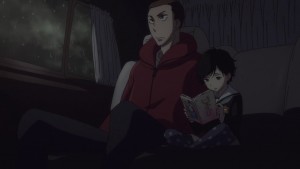 There’s no question about it – one of the challenges when writing about Shouwa Genroku Rakugo Shinjuu is to avoid fawning over it. When a series is as consistently great as this one is, week after week, criticism runs the risk of becoming a bit one-note. But what can one do? It’s not like I’m going to invent faults where they don’t exist just for variety – quality is quality, and Shouwa Genroku exudes it from every pore. This is one of anime’s most subtle and thoughtful shows this decade, and it deserves immense respect from those of us lucky enough to be following it.
There’s no question about it – one of the challenges when writing about Shouwa Genroku Rakugo Shinjuu is to avoid fawning over it. When a series is as consistently great as this one is, week after week, criticism runs the risk of becoming a bit one-note. But what can one do? It’s not like I’m going to invent faults where they don’t exist just for variety – quality is quality, and Shouwa Genroku exudes it from every pore. This is one of anime’s most subtle and thoughtful shows this decade, and it deserves immense respect from those of us lucky enough to be following it.
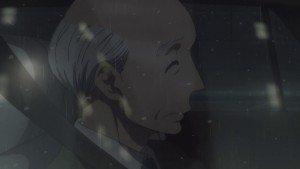 A couple of things stand out for me this week, just as they do every week (though Rakugo does so many things well they’re rarely the same). First off, what a beautiful episode this was. Yes, beautiful in the emotional sense, but I’m talking visually here. The scene between Konatsu and Yakumo in the park especially stands out – a riot of golden leaves and post-shower puddles, a frail old man lost inside a dressing gown, the tough and hard young woman who loves him trying to feign unconcern. Yet it’s equalled by the transition Hatakeyama-sensei uses when Yotarou is literally transported by his namesake Sukeroku’s storytelling – it’s a stunning sequence, revealing just how important this sadly under-appreciated director’s contributions are to Shouwa Genroku’s success.
A couple of things stand out for me this week, just as they do every week (though Rakugo does so many things well they’re rarely the same). First off, what a beautiful episode this was. Yes, beautiful in the emotional sense, but I’m talking visually here. The scene between Konatsu and Yakumo in the park especially stands out – a riot of golden leaves and post-shower puddles, a frail old man lost inside a dressing gown, the tough and hard young woman who loves him trying to feign unconcern. Yet it’s equalled by the transition Hatakeyama-sensei uses when Yotarou is literally transported by his namesake Sukeroku’s storytelling – it’s a stunning sequence, revealing just how important this sadly under-appreciated director’s contributions are to Shouwa Genroku’s success.
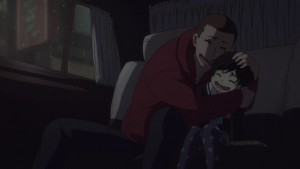 The other noteworthy element for me is mood. I’m not certain whether Hatakeyama and Kumota-sensei are doing this intentionally (I suspect they are) but each episode in the anime at least has a very distinct mood. And that mood is matched by the tone of the stories the characters tell on stage. We’ve seen the sunny optimism and hopefulness of the “Jugemu, Jugemu” episode. the sinister foreboding of “Hangon-ko”. And this time, the tone is one of wistful melancholy – as perfectly reflected the Sukeroku’s “Shibahama” – his final performance, and one of the most earnest and sentimental stories in the rakugo canon (and thus, totally outside his normal bailiwick). Regret and fatalism are in the air here as the past collides with the present in the most direct manner we’ve seen so far.
The other noteworthy element for me is mood. I’m not certain whether Hatakeyama and Kumota-sensei are doing this intentionally (I suspect they are) but each episode in the anime at least has a very distinct mood. And that mood is matched by the tone of the stories the characters tell on stage. We’ve seen the sunny optimism and hopefulness of the “Jugemu, Jugemu” episode. the sinister foreboding of “Hangon-ko”. And this time, the tone is one of wistful melancholy – as perfectly reflected the Sukeroku’s “Shibahama” – his final performance, and one of the most earnest and sentimental stories in the rakugo canon (and thus, totally outside his normal bailiwick). Regret and fatalism are in the air here as the past collides with the present in the most direct manner we’ve seen so far.
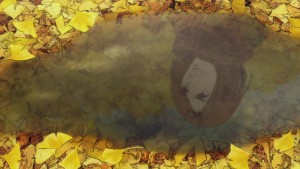 Yakumo is certainly feeling that regret. He’s largely refraining from talking after his heart attack, and he tells Konatsu that he’s lost his “blessing” – the drive and ability to tell stories. In truth, feeble as he is, the loss of his stage voice is a convenient ruse for the old man – he’s been ready to quit rakugo (and life) for a long time. It’s quite stunning when he tells Konatsu that his thought as he lay helpless on stage was “Now I won’t have to do rakugo anymore”. Yet he also says that the worst tragedy would be for him to become satisfied with his own rakugo. With no drive to tell stories, there’s really nothing tethering Yakumo to this world – he’s as ethereal and formless as the spectres he saw in the incense smoke during his “Hangon-ko”.
Yakumo is certainly feeling that regret. He’s largely refraining from talking after his heart attack, and he tells Konatsu that he’s lost his “blessing” – the drive and ability to tell stories. In truth, feeble as he is, the loss of his stage voice is a convenient ruse for the old man – he’s been ready to quit rakugo (and life) for a long time. It’s quite stunning when he tells Konatsu that his thought as he lay helpless on stage was “Now I won’t have to do rakugo anymore”. Yet he also says that the worst tragedy would be for him to become satisfied with his own rakugo. With no drive to tell stories, there’s really nothing tethering Yakumo to this world – he’s as ethereal and formless as the spectres he saw in the incense smoke during his “Hangon-ko”.
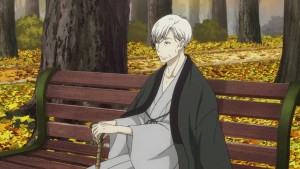 Meanwhile, as teased, Yakumo has gone off with Hii-sensei to see a film of Sukeroku performing “Shibahama” – and it is indeed that performance. Matsuda-san tags along, unable to resist the urge to see Sukeroku one more time, and for both he and Hiiguchi-sensei, it’s their finest hour of the series. Matsuda’s devotion to Yakumo is truly heartbreaking, and Hiiguchi’s past sheds a good deal of light on how he became the man he is – and why he’s so obsessed with both Yakumo and saving rakugo.
Meanwhile, as teased, Yakumo has gone off with Hii-sensei to see a film of Sukeroku performing “Shibahama” – and it is indeed that performance. Matsuda-san tags along, unable to resist the urge to see Sukeroku one more time, and for both he and Hiiguchi-sensei, it’s their finest hour of the series. Matsuda’s devotion to Yakumo is truly heartbreaking, and Hiiguchi’s past sheds a good deal of light on how he became the man he is – and why he’s so obsessed with both Yakumo and saving rakugo.
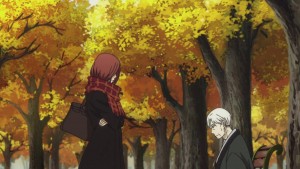 For starters, there’s Kikuhiko (before he was Yakumo) performing “Akegarasu” (also seen in Episode 12). Apart from the significance of the story – as noted then, it centers on a naive young man who falls in love with a courtesan (the two would later become part of Japan’s most famous double-suicide) – it’s quite striking to see Bon performing with such youthful intensity again. It reveals how much his style as a performer has evolved, but it’s also a poignant reminder of that which has been lost and can never be regained – and it impacts Yotarou, Hiiguchi and Matsuda profoundly.
For starters, there’s Kikuhiko (before he was Yakumo) performing “Akegarasu” (also seen in Episode 12). Apart from the significance of the story – as noted then, it centers on a naive young man who falls in love with a courtesan (the two would later become part of Japan’s most famous double-suicide) – it’s quite striking to see Bon performing with such youthful intensity again. It reveals how much his style as a performer has evolved, but it’s also a poignant reminder of that which has been lost and can never be regained – and it impacts Yotarou, Hiiguchi and Matsuda profoundly.
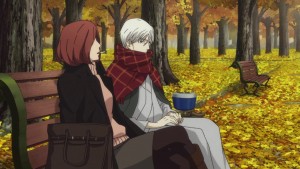 Then there’s Sukeroku, and that final performance of “Shibahama”. If you’ll recall, this was a Shin who hadn’t performed much rakugo in a very long time, yet his performance (though Yamdera Kouichi of course) is transcendent. It reflects a Shin who had changed so much in his time away from the stage – I don’t think the Sukeroku of Tokyo could have told a story so lacking in irony as “Shibahama” with such conviction. This only adds to the tragedy, of course, knowing what’s to come – Shin had found some sort of peace in his life, even if it was never destined to last.
Then there’s Sukeroku, and that final performance of “Shibahama”. If you’ll recall, this was a Shin who hadn’t performed much rakugo in a very long time, yet his performance (though Yamdera Kouichi of course) is transcendent. It reflects a Shin who had changed so much in his time away from the stage – I don’t think the Sukeroku of Tokyo could have told a story so lacking in irony as “Shibahama” with such conviction. This only adds to the tragedy, of course, knowing what’s to come – Shin had found some sort of peace in his life, even if it was never destined to last.
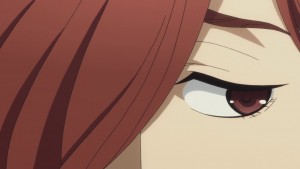 It’s useful to reflect back on Episode 12 here, because this story is a closed circle. It’s a tragedy in that we know (though not so much as we think) what’s going to happen, and the tragedy of the distant past directly fuels the tragedy in the present. The question of blame is central to all of this, but even now, almost a year later, I don’t find myself blaming anyone (not even Miyokichi, who’s most directly the cause of what happened). The heart wants what it wants, and all of these characters are in the end merely human – and rakugo is in the end merely a thing. It can never give someone the same things the love of another person can, no matter how much anyone may love it.
It’s useful to reflect back on Episode 12 here, because this story is a closed circle. It’s a tragedy in that we know (though not so much as we think) what’s going to happen, and the tragedy of the distant past directly fuels the tragedy in the present. The question of blame is central to all of this, but even now, almost a year later, I don’t find myself blaming anyone (not even Miyokichi, who’s most directly the cause of what happened). The heart wants what it wants, and all of these characters are in the end merely human – and rakugo is in the end merely a thing. It can never give someone the same things the love of another person can, no matter how much anyone may love it.
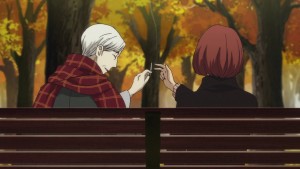 Did I suspect the truth of what really happened all those years earlier? Yes, probably. I certainly suspected that Kikuhiko had declined to relate the full truth of what happened to Yotarou. I think the most pressing question for Shouwa Genroku, though, is whether Konatsu suspects the truth of it. She was a small child, and in shock – but she was there. She saw – but how much did she understand? For now all we can do is speculate on the answer, but it’s utterly pivotal to our interpretation of everything that’s happened in this story. Does Konatsu resent Yakumo for what she sees as killing her parents, or – as seems more likely to me – is that resentment an outward projection of the anger she feels at herself, and at Kikuhiko for trying to take all that on himself in her stead?
Did I suspect the truth of what really happened all those years earlier? Yes, probably. I certainly suspected that Kikuhiko had declined to relate the full truth of what happened to Yotarou. I think the most pressing question for Shouwa Genroku, though, is whether Konatsu suspects the truth of it. She was a small child, and in shock – but she was there. She saw – but how much did she understand? For now all we can do is speculate on the answer, but it’s utterly pivotal to our interpretation of everything that’s happened in this story. Does Konatsu resent Yakumo for what she sees as killing her parents, or – as seems more likely to me – is that resentment an outward projection of the anger she feels at herself, and at Kikuhiko for trying to take all that on himself in her stead?
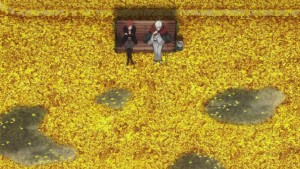 Blame, again, is everything – and no more so than blaming the self. That tragedy at Kame-ya has become the tragedy of Kikuhiko’s life. He’s accepted the blame so as to protect Konatsu for so long that it’s become a part of him – and he no doubt does blame himself for what happened, even if the true sequence of events was different than what he told Yotarou. Bon was only too happy to give the Yakumo title to Shin, and Shin seemed willing to accept it in the end – so not even his stature in rakugo can give Yakumo respite from the pain he feels. I’m not sure the truth would shock Konatsu, because I think she knows it deep down – but I also don’t know that it would change the way either of them feel about what happened. There are going to be no easy or painless answers in these final episodes, because the wounds simply run too deep.
Blame, again, is everything – and no more so than blaming the self. That tragedy at Kame-ya has become the tragedy of Kikuhiko’s life. He’s accepted the blame so as to protect Konatsu for so long that it’s become a part of him – and he no doubt does blame himself for what happened, even if the true sequence of events was different than what he told Yotarou. Bon was only too happy to give the Yakumo title to Shin, and Shin seemed willing to accept it in the end – so not even his stature in rakugo can give Yakumo respite from the pain he feels. I’m not sure the truth would shock Konatsu, because I think she knows it deep down – but I also don’t know that it would change the way either of them feel about what happened. There are going to be no easy or painless answers in these final episodes, because the wounds simply run too deep.


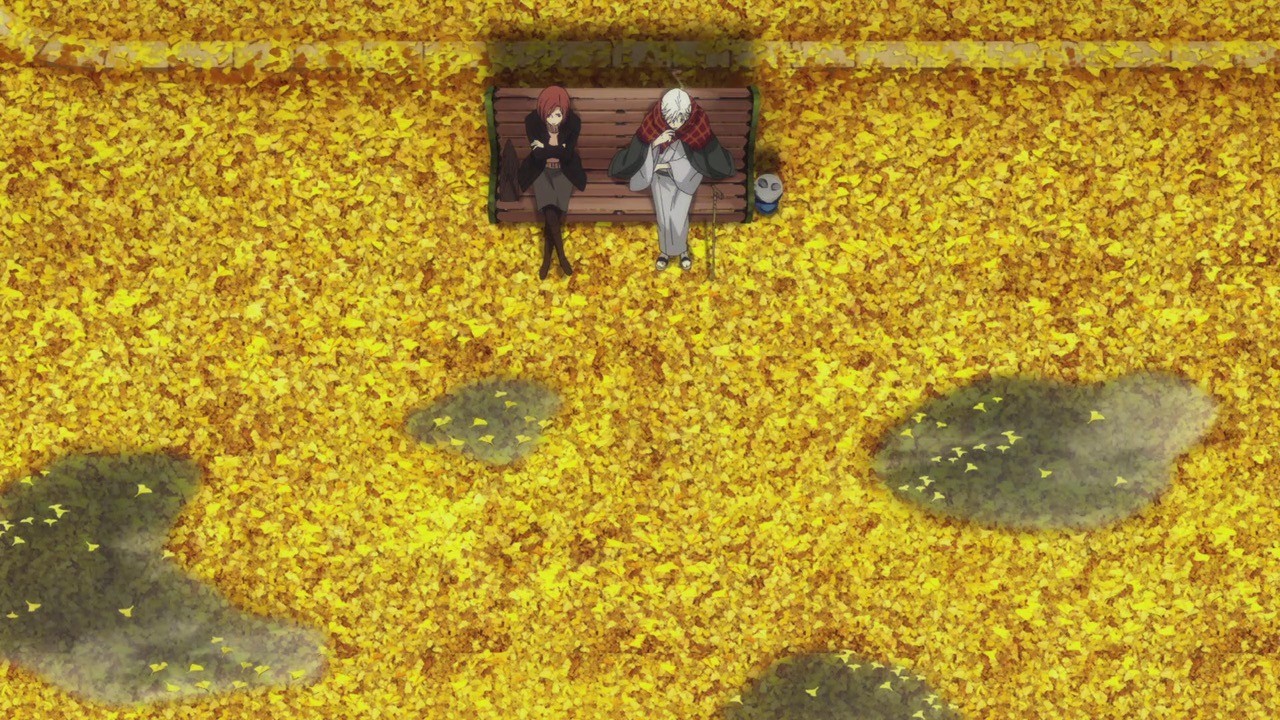
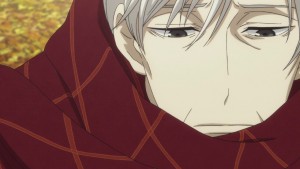
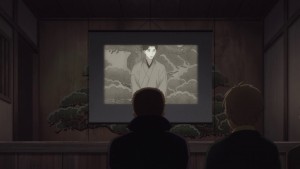
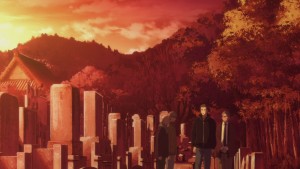
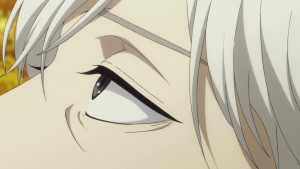
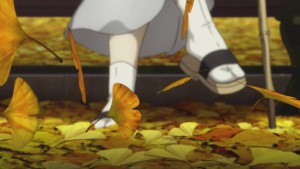
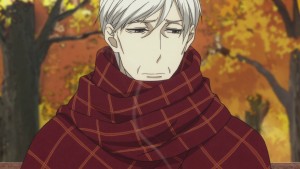
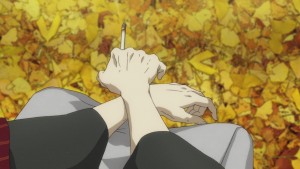
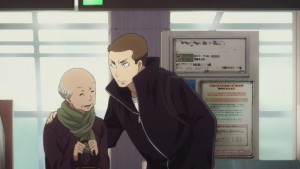
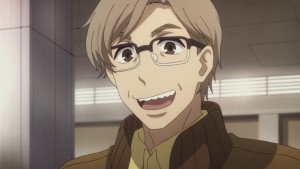
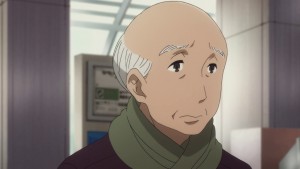
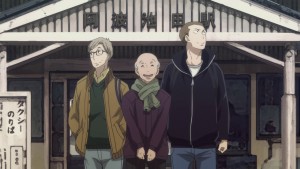
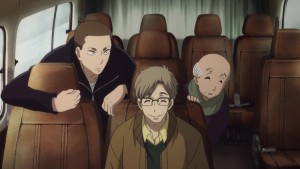
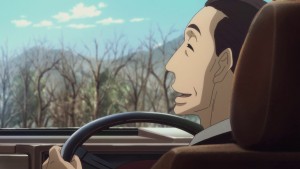
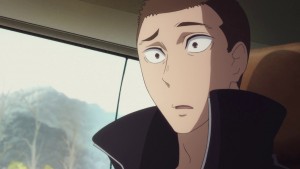
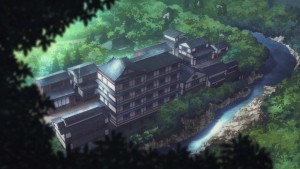
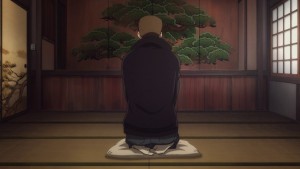
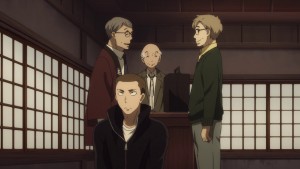
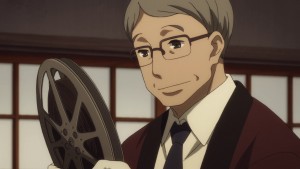
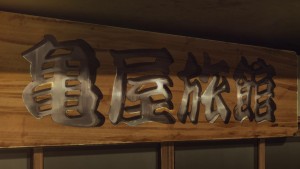
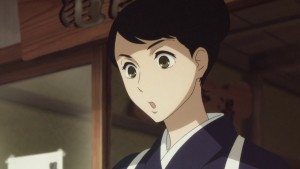
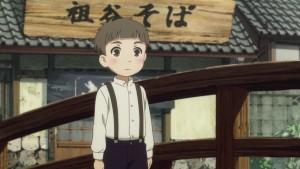
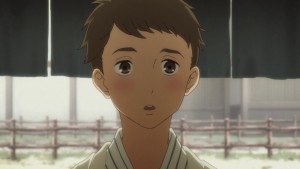
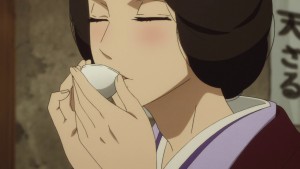
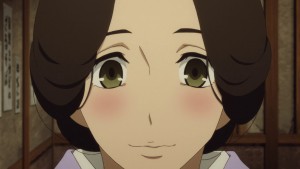
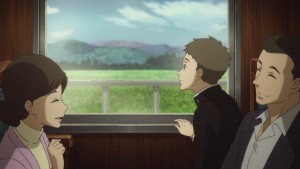
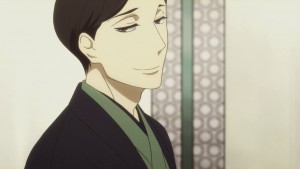
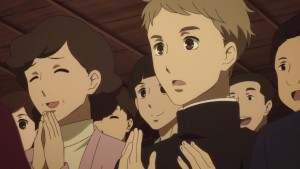
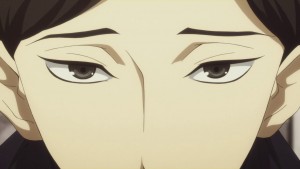
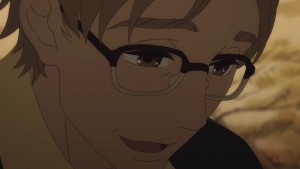
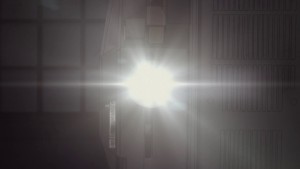
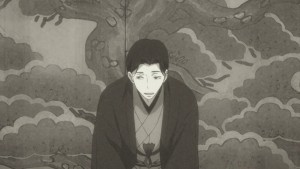
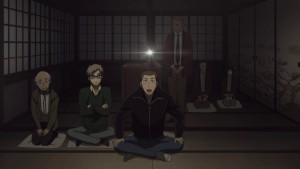
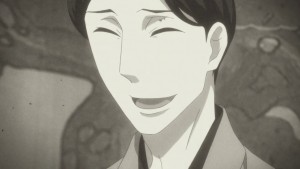
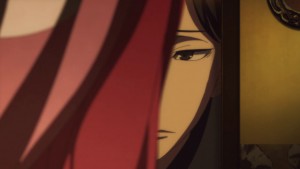
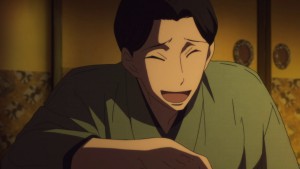
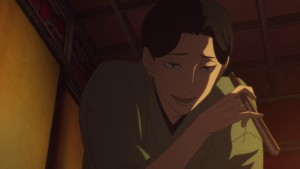
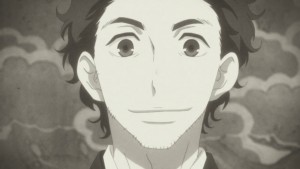
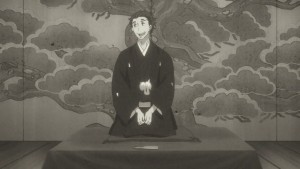
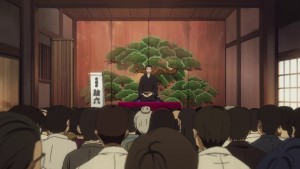
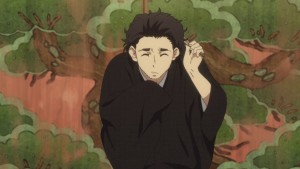
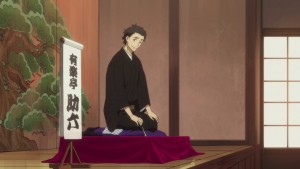
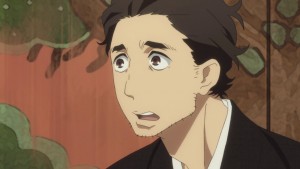
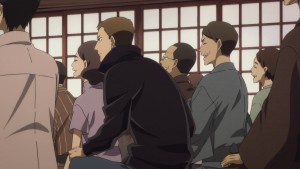
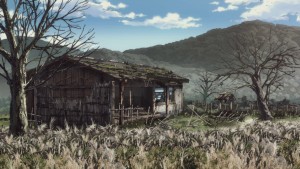
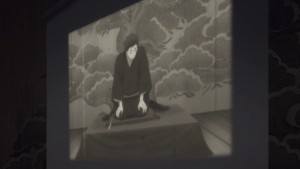
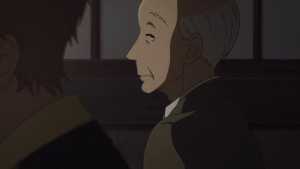
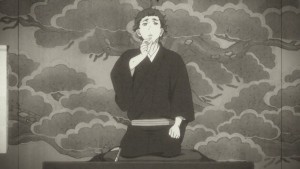
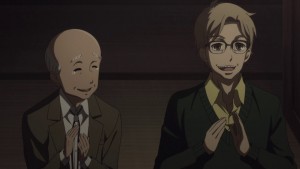
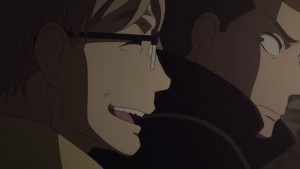
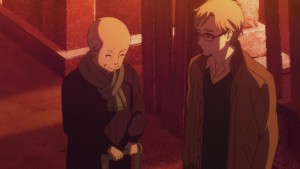
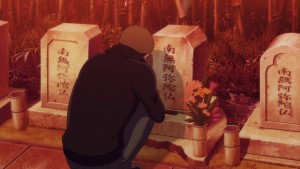

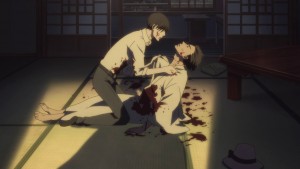
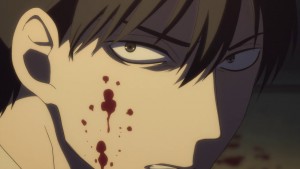
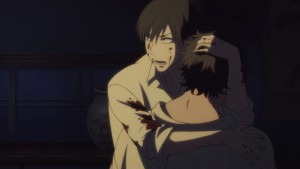
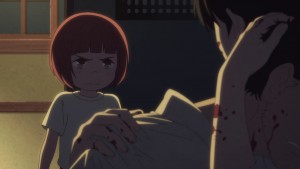
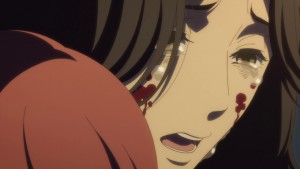
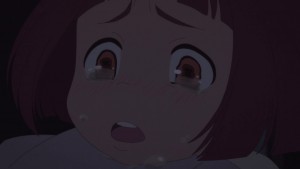
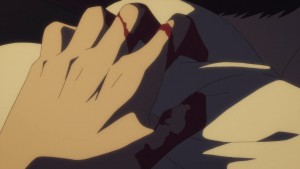
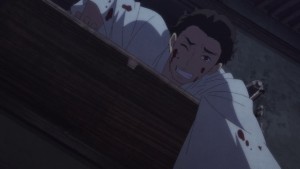
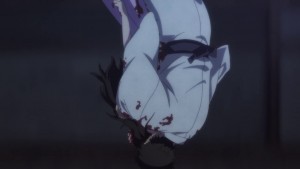
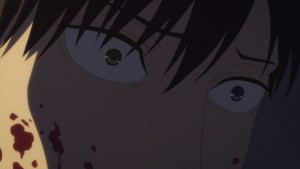
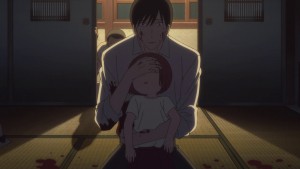
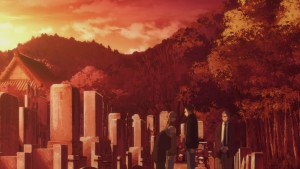
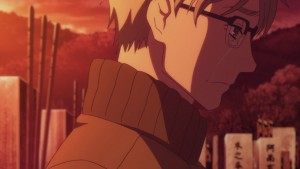
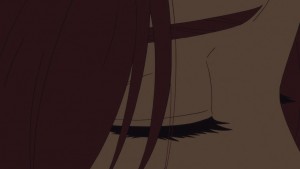
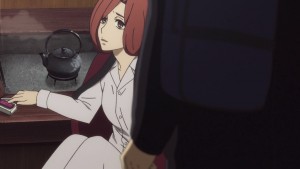
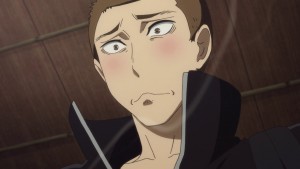
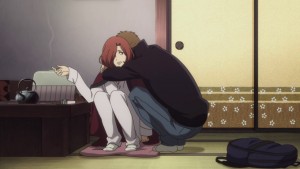
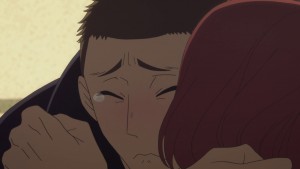
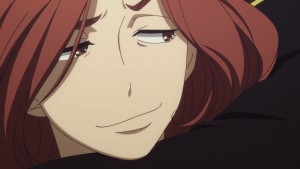
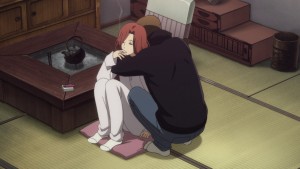


Flower
February 17, 2017 at 9:51 pmI couldn’t agree more about the beauty of this episode … man … although it reminded me immediately of the exquisite art from Koufuku Graffitti, strangely. That brought up the wonderful thought that studios not so infamous for their artistic presentation (like, say, ufotable or mappa or PAW or KyoAni) are still more than capable of cranking such … breathtaking things if they are able and willing to do so. It leaves an odd bittersweetness in me somehow. ^^
Yukie
February 17, 2017 at 10:17 pmI read the manga chapter of this part and was really looking forward to seeing how they would adapt it, and I have to say they really went beyond my expectations. In particular, a lot of the scenes shown during the rakugo video were added in the anime, and I think it visually enhanced the emotional experience of Yotaro as an audience watching Kikuhiko and Sukeroku. There’s also that moment when we are shown the dilapidated house and the outside of the inn, both of which remind us of season 1 (I almost teared up). The scene with Konatsu and Yakumo among the gingko leaves also looks even more stunning with color. I could gush for ages, but I should stop here.
Now that we’re at the halfway point of the anime, I cannot wait to see how Yakumo’s journey will end. Rakugo certainly won’t die even if he commits a double suicide, so I really hope he forgives himself. Though it’s also extremely likely the story will gradually shift to focus on Shinnosuke.
Zilla
February 18, 2017 at 7:24 amOh dear lord, that scene with the puddles and the falling ginkgo leaves! This anime has never stinted on the animation, but DAMN they threw a bunch of time and money at that scene! So freaking gorgeous. It made the emotional impact of the scene exponentially stronger.
Matsuda broke my heart a couple times this episode. He is such a sweetheart. And the way they had him “hiding” behind Yota and popping out from behind him was adorable.
I had just rewatched season 1 this week prior to this episode, and episode 12 was even more gut-wrenching after seeing this season so far, even already knowing that some of it must be fabricated. So with this episode it was really nice to see that the brilliance of that last “Shibahama” was as depicted in Yakumo’s memories. The personal journey of Sukeroku was indeed as depicted and not romanticized in the telling.
Unfortunately with this episode the series has crossed a magical line for me. I can no longer try to force people to watch it, because if I make them watch it and they don’t love it, I will probably think less of them.
Christine
February 21, 2017 at 8:12 amI guess the money spent on the beautiful autumn bench scene evens out with the recycled footage of Sukeroku performing his last rakugo. That’s some perfect management right there. But this anime has always been about the little touches as well as the big ones. The OP sequence featured a small modification to reflect an episode where we find out more about the real Miyochikichi–or rather, Yurie. There really isn’t much we know about her, except for our growing sense that she must have been SOMEONE with a whole life and set of experiences behind her, a family, a hometown, etc. The show doesn’t sweep her under the rug as a flat character and instead delves right into how real she was, and how we’ll probably never understand everything about her. Geez, this show really loves focusing on loss.
I was frankly expecting the film to show a different version of Sukeroku’s performance, maybe one where he couldn’t live up to professional standards anymore. That would have been heartbreaking and might have made a good trigger for the tragic end. What we got instead makes just as much sense, but the only reason the revelation has such an impact is because SGRS has laid ALL the groundwork. What might have been vapid melodrama in another show is just horrifying and heartbreaking here.